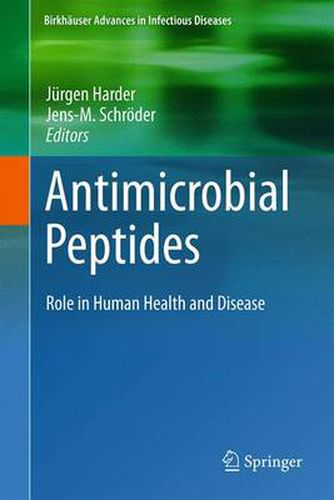Readings Newsletter
Become a Readings Member to make your shopping experience even easier.
Sign in or sign up for free!
You’re not far away from qualifying for FREE standard shipping within Australia
You’ve qualified for FREE standard shipping within Australia
The cart is loading…






This book focuses on the importance of human antimicrobial peptides (AMP) in keeping the host healthy and preventing infectious diseases. The first chapters deal with several examples of the role of AMP in different epithelial organs (skin and wound healing, eye, lung, genito-urinary tract, gut), which are exposed to different kinds of infectious microorganisms and as a result produce different patterns of AMP. Examples of the dysregulation of AMP expression and function promoting infections are discussed. The capacity of AMP to restrict the availability of essential metals to bacteria as an efficient antibacterial strategy in nutritional immunity is discussed in the next chapter. Our current understanding of how vitamin D, the sunshine vitamin, influences AMP-expression and how this can affect our health is also addressed. Last but not least, the role of AMP in HIV infection and the immunomodulatory properties of AMP highlight the diverse facets of AMP in host immunity. AMP’s specific functions, including in fighting multi-resistant bacteria, suggest that they may offer therapeutic benefits - a question that is discussed in the final chapter.
$9.00 standard shipping within Australia
FREE standard shipping within Australia for orders over $100.00
Express & International shipping calculated at checkout
This book focuses on the importance of human antimicrobial peptides (AMP) in keeping the host healthy and preventing infectious diseases. The first chapters deal with several examples of the role of AMP in different epithelial organs (skin and wound healing, eye, lung, genito-urinary tract, gut), which are exposed to different kinds of infectious microorganisms and as a result produce different patterns of AMP. Examples of the dysregulation of AMP expression and function promoting infections are discussed. The capacity of AMP to restrict the availability of essential metals to bacteria as an efficient antibacterial strategy in nutritional immunity is discussed in the next chapter. Our current understanding of how vitamin D, the sunshine vitamin, influences AMP-expression and how this can affect our health is also addressed. Last but not least, the role of AMP in HIV infection and the immunomodulatory properties of AMP highlight the diverse facets of AMP in host immunity. AMP’s specific functions, including in fighting multi-resistant bacteria, suggest that they may offer therapeutic benefits - a question that is discussed in the final chapter.